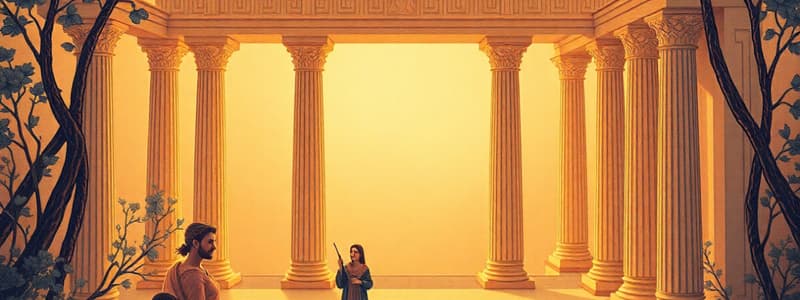Podcast
Questions and Answers
What was the primary goal of Roman education?
What was the primary goal of Roman education?
- To train individuals for specialized professions
- To produce a Roman orator who is an encyclopedia (correct)
- To prioritize practical knowledge over theoretical understanding
- To create a standardized system for vocational training
Which philosopher emphasized the importance of maturity in learning?
Which philosopher emphasized the importance of maturity in learning?
- Plato
- Quintilian (correct)
- Aristotle
- Cicero
How did Roman education influence modern educational systems?
How did Roman education influence modern educational systems?
- By completely eliminating the need for textbooks
- By introducing the concept of educational psychology (correct)
- By focusing solely on physical education
- By promoting student-centered learning exclusively
What concept emerged from Roman education that significantly influenced information access?
What concept emerged from Roman education that significantly influenced information access?
Why did Romans advocate for state control of schools?
Why did Romans advocate for state control of schools?
Which aspect of education did the Romans particularly emphasize for orators?
Which aspect of education did the Romans particularly emphasize for orators?
What type of contribution did the Roman educational system make to the structure of curriculums?
What type of contribution did the Roman educational system make to the structure of curriculums?
What was one of the effects of Roman education on education systems in other countries?
What was one of the effects of Roman education on education systems in other countries?
What was the primary aim of the Athenian education system?
What was the primary aim of the Athenian education system?
At what age did Athenian children typically start school?
At what age did Athenian children typically start school?
What kind of teacher was commonly found in Athenian schools?
What kind of teacher was commonly found in Athenian schools?
What was one significant difference between the education of boys and girls in Athens?
What was one significant difference between the education of boys and girls in Athens?
What was the primary aim of the Spartan education system?
What was the primary aim of the Spartan education system?
Which of the following activities were Spartan children primarily taught?
Which of the following activities were Spartan children primarily taught?
What did the Spartan education system emphasize regarding communication?
What did the Spartan education system emphasize regarding communication?
Which famous educators contributed significantly to modern education as a result of the Greek education system?
Which famous educators contributed significantly to modern education as a result of the Greek education system?
Flashcards are hidden until you start studying
Study Notes
Greek System of Education
- Greece consisted of several independently governed city-states, notably Athens and Sparta.
- Athenian education aimed at democratic ideals and produced skilled orators for public assembly.
- Children began formal education at seven years old, with instruction often from a slave or poor freeman.
- Athenian boys learned poetry, reading, writing, public speaking, and debate.
- Girls were educated at home primarily for domestic roles, fostering skills to become good wives.
- Spartan education focused on preparing healthy warriors for state defense, emphasizing physical strength.
- Spartan boys were enrolled in a state-run boarding school at age seven, focusing on wrestling, boxing, and combat skills.
- Discipline was paramount; boys learned obedience and fearlessness, speaking minimally.
- At eighteen, Spartan boys graduated to military service until age thirty, after which they returned to family life.
- Spartan girls were trained to appreciate physical fitness over intellectual pursuits.
- Notable Greek educators like Socrates, Plato, and Aristotle contributed significantly to modern educational thought.
Roman Education
- Roman education stressed the development of orators knowledgeable across various subjects, adhering to a comprehensive educational philosophy.
- The Roman system comprised distinct educational stages, contributing to the standardization of curricula.
- Influential Roman educators included Quintilian and Cicero, who impacted theories in education.
- The Romans introduced concepts such as educational psychology, recognizing individual differences and maturity in learners.
- The practice of structuring knowledge progression according to the learner's age and readiness emerged, preventing overwhelming information overload.
- The concept of the encyclopedia also originated from Roman education, leading to significant compilations of knowledge.
- State control was advocated over schools, viewing education as essential for societal participation, mirroring a mini-society model.
- Roman educational influences extended globally, shaping the British educational model and, subsequently, Nigeria’s systems post-independence in 1960.
- Nigerian curriculum reflects Roman principles in communication and social studies, underscoring the practical applicability of their educational philosophies.
Studying That Suits You
Use AI to generate personalized quizzes and flashcards to suit your learning preferences.



